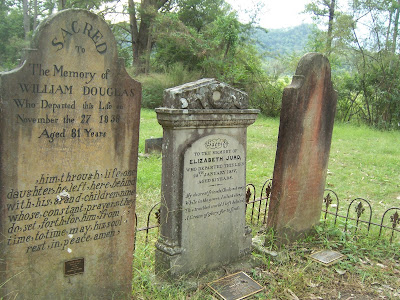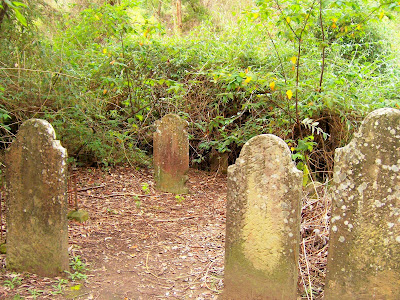St Alban's, in the McDonald Valley, was still a two to three day, spine-jarring, bone-rattling Cobb & Co coach journey from Sydney when the Settlers Arms Inn, near the banks of the McDonald River, was heaving with travelers in the mid-1800s. But not just anybody could stay at such prestigious digs, as this reproduction of an original sign in the bar from that era makes clear :

Four pence a night for Bed
Six pence with Supper
No more than five to sleep in one bed
No Boots to be worn in bed
Organ Grinders to sleep in the Wash house
No dogs allowed upstairs
No Beer allowed in the Kitchen
No Razor Grinders or Tinkers taken in
Only five to a bed?
Outside of a local's explanation, "Tinkers would steal anything not bolted down," I don't have any valuable information to hand as to why Organ Grinders were thought only slightly more worthy of the most basic of accommodations than Tinkers or Razor Grinders, who were utterly banished.
The dark, atmospheric Settlers Arms today :

The sandstone blocks used to build the inn were hacked out, and usually transported, by convict slave labour. Breaking tools in the shaping of the sandstone could bring savage floggings, or death. Horses were more valuable than men, Aborigines were less valued than dogs. The McDonald Valley is one of the most beautiful and untouristed areas of New South Wales, with an extraordinary history soaked in extreme violence, incredible pioneering spirit, hardship, emancipation and back breaking work.
The St Alban's graveyard, like the inn, is small, but rich with history. The graves of the original white settlers dating back to the 1820s still stand, others older and forgotten decay into the ever creeping foliage.


Some local history, from the late 1700s into the early 1800s :
During this time the relations between the indigenous aboriginal population in the area was reasonably harmonious, the area being populated by the Dharug and Barkinung people who called the river Deerubbin.More Here
The natives treated the newcomers as welcome guests, teaching bush skills and assisting in the planting of crops, they did not realize that the whites intended to stay and claim ownership of the land. Property ownership was completely alien to the Aboriginal; one cared for the land, but did not own it any more than one could own the sky overhead or the air one breathed.
The convicts and their keepers were the dregs of English society and were a hard and ruthless bunch and unfortunately conflicts soon developed as the Aborigines were denied access to many of their traditional areas, with Yam beds destroyed as wheat and corn were planted on the river flats and the banks denied to them for fishing, their traditional foods.
There are recorded cases of Aborigines providing labor on farms in exchange for a share of the crop and then massacred rather than given their share. They, in turn retaliated by setting fire to the crops just as harvesting was due. Regulations were introduced prohibiting Aborigines entry to established farm areas again denying them their food supply.
Photos by Darryl Mason